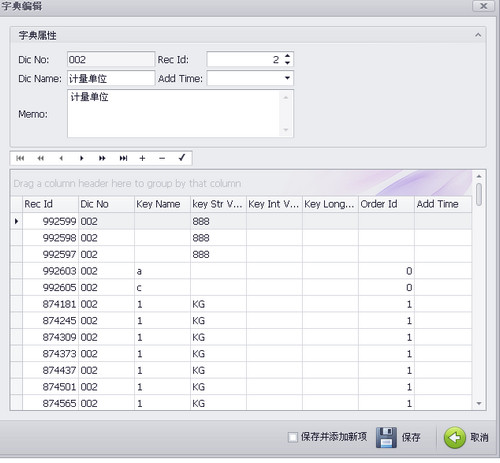Devexpress + wcf +ef 批量更新处理
项目结构:
1.客户端:Winform,
2.数据访问:EF4.0(从数据库生成模型-懒人必需这样)
3.DTO:直接使用EF实体
4.服务端:WCF 托管在IIS中采用basicHttp帮定(这样可以客户端的代理类就不需要每次人肉释放了)
Winform或asp.net ,MVC中每次一般只操作一条记录或者对多条记录进行相同的操作,这个时候我们知道需要对记录或记录集合进行的是那种CURD.
但是如果直接将获取的记录集合 List<T> 帮定到BindingSource并关联DataGridView(或gridControl),并且使用gridControl提供的CURD功能时,怎么才能知道那些记录需要进行那些CURD操作呢?
解决方案暂时不提, 凭借gridcontrol提供的强大功能,一般的单个数据表CRUD可以直接拖控件完成,要知道在一般的企业项目中有大量的基础数据收集维护功能,尤其当你是一个人在战斗时,能拖个控件就把CURD完成时是多么的有幸福,而且现在是采用标准的三层结构,你可以对服务层做下反向代理以实现负载均衡了。
解决办法
界面如下 
EF默认在Context中保存对象的状态,但是当对象通过WCF传输后,我们在两端获取对方传输过来的对象多是Detached状态,而且在客户端典型的用法是直接将List<T>帮定到BindingSrouce上,根本不使用EFContext对象进行跟着。
1.那么解决首先是要在客户端对List<T>的对象进行跟踪 要进行跟踪懒人加吊丝的做法当然不是自己实现EF跟踪接口,而是直接使用EFContext对象, 那客户端EFContext对象直接SaveChanges连数据库怎么办? 参考下面的配置,将EF连接字符串的关键信息全部换成*,这样你就能在WinForm中正常的New出Context对象了

<add name="FireSeatEntities" connectionString="metadata=res://*/FireSeatDB.csdl|res://*/FireSeatDB.ssdl|res://*/FireSeatDB.msl;provider=System.Data.SqlClient;provider connection string="data source=****;initial catalog=****;persist security info=True;user id=****;password=***;multipleactiveresultsets=True;App=EntityFramework"" providerName="System.Data.EntityClient" />
2.将服务端加载对象添加到Context环境中 2.1.首先是第一次加载,一般是由一个查询引起的

var dicItems= Fetch<IDicItemsService>().Take(0,100,string.Format("it.DicNo='{0}'", cur.DicNo), "it.OrderId");
foreach (var item in dicItems)
{
EntCtx.Attach(item); //这里进行附加
}
//绑定到BindingSource
sys_DicItemsBindingSource.DataSource = dicItems;
2.2.对gridControl进行的添加擅长操作做提示并关联到Context

dataNavigator1.ButtonClick += (s, ie) => {
try
{
#region
if (ie.Button.ButtonType == NavigatorButtonType.Append)
{
var dicNo = dicNoTextEdit.Text.Trim();
if (string.IsNullOrWhiteSpace(dicNo)) throw new Exception("请输入字典编号!");
var cur = sys_DicItemsBindingSource.AddNew() as Sys_DicItems;
cur.DicNo = dicNo;
EntCtx.CreateObjectSet<Sys_DicItems>().AddObject(cur);
ie.Handled = true;
}
else if (ie.Button.ButtonType == NavigatorButtonType.Remove)
{
var cur = sys_DicItemsBindingSource.Current as Sys_DicItems;
if ( MessageBox.Show("确认删除吗?", "提示", MessageBoxButtons.OKCancel, MessageBoxIcon.Warning) == System.Windows.Forms.DialogResult.Cancel)
{
ie.Handled = true;
return;
}
EntCtx.DeleteObject(cur);
}
else if (ie.Button.ButtonType == NavigatorButtonType.EndEdit)
{
gridView1.CloseEditor();
}
#endregion
}
catch (Exception ex)
{
ie.Handled = true;
ErrMsg(ex.Message);
}
};
2.3.对gridcontrol 进行 大量 添加,修改,删除后点保存

gridView1.CloseEditor();
sys_DicItemsBindingSource.EndEdit();
//获取进行了CUD的记录集合
var addList = EntCtx.ObjectStateManager.GetObjectStateEntries(EntityState.Added).Select(osEnt => osEnt.Entity as Sys_DicItems).ToList();
var delList = EntCtx.ObjectStateManager.GetObjectStateEntries(EntityState.Deleted).Select(osEnt => osEnt.Entity as Sys_DicItems).ToList();
var editList = EntCtx.ObjectStateManager.GetObjectStateEntries(EntityState.Modified).Select(osEnt => osEnt.Entity as Sys_DicItems).ToList();
#region 更新字典条目
EntityUpdateSet<Sys_DicItems> retDs = null;
Action act = () =>
{
var ds = new EntityUpdateSet<Sys_DicItems>(addList, delList, editList) {ReturnAddList=true,ReturnEditList=true };
retDs = Fetch<IDicItemsService>().BatchUpdate(ds);
};
InvokeService(act, "更新列表");
//将服务器返回记录归并到本地
for (int i = 0; i < retDs.AddList.Count; i++)
{
CloneEFModel<Sys_DicItems, Sys_DicItems>(retDs.AddList[i], addList[i]);
}
for (int i = 0; i < retDs.EditList.Count; i++)
{
CloneEFModel<Sys_DicItems, Sys_DicItems>(retDs.EditList[i], editList[i]);
}
//将所以记录设置成Unchange状态
EntCtx.AcceptAllChanges();
sys_DicItemsBindingSource.ResetBindings(false);
3.服务端的定义
EntityUpdateSet定义了CUD操作对应的列表

public class EntityUpdateSet<T>
where T : System.Data.Objects.DataClasses.EntityObject
{
public EntityUpdateSet()
{
AddList = new List<T>();
ReturnAddList = true;
DelList = new List<T>();
ReturnDelList = false;
EditList = new List<T>();
ReturnEditList = false;
}
public EntityUpdateSet(List<T> addList, List<T> delList, List<T> editList):this()
{
this.AddList = addList;
this.DelList = delList;
this.EditList = editList;
}
public List<T> AddList { get; set; }
public bool ReturnAddList { get; set; }
public List<T> DelList { get; set; }
public bool ReturnDelList { get; set; }
public List<T> EditList { get; set; }
public bool ReturnEditList { get; set; }
}
具体的操作,这个应该都清楚了

public EntityUpdateSet<T> BatchUpdate(EntityUpdateSet<T> ds)
{
BatchUpdateVerify(ds);
var set = Ctx.CreateObjectSet<T>();
foreach (var addItem in ds.AddList)
{
set.AddObject(addItem);
}
foreach (var delItem in ds.DelList)
{
set.Attach(delItem);
set.DeleteObject(delItem);
}
foreach (var editItem in ds.EditList)
{
set.Attach(editItem);
Ctx.ObjectStateManager.ChangeObjectState(editItem, System.Data.EntityState.Modified);
}
Ctx.SaveChanges();
if (!ds.ReturnAddList) ds.AddList.Clear();
if (!ds.ReturnDelList) ds.DelList.Clear();
if (!ds.ReturnEditList) ds.EditList.Clear();
return ds;
}
最后很最重要的一点是:在关闭窗体后需要释放对象,不然大量数据加长时间运行会导致客户端内存泄露的
protected override void OnClosed(EventArgs e)
{
base.OnClosed(e);
sys_DicItemsBindingSource.Dispose();
sys_DicBindingSource.Dispose();
if (EntCtx != null) EntCtx.Dispose();
}
最后之最后,最最总要的一点是,NND即使使用了上面的释放代码,内存一样只增不减,那位兄弟帮忙解决下啊 (首先排除是WCF代理对象未释放问题,Fetch<IDicItemsService> 获取缓存的代理对象,进行不停调用,不会出现内存问题,只有把EFModel attch到客户端的Context时才出现问题)




 浙公网安备 33010602011771号
浙公网安备 33010602011771号